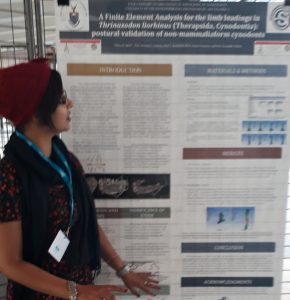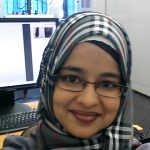What is your scientific background?
Zoology, Ecology and Palaeontology
Why did you choose to become a scientist?
I really enjoyed the specific topics that I studied during my undergrad which outlined the vast research that still needs to be conducted. And as a kid that was curious to learn more about the world, how things functioned and asking more questions at the end then when I started, I knew science is where I’d like to base my career.
What is your background (where are you from, where did you go to school, what was your childhood experience like) and has it moulded you?
I am from Roshnee, just outside Vereeniging. I went to Roshnee Primary and Roshnee Secondary School. My childhood was me being very into my studies and always trying to figure out how things work. Till today, I am very fidgety and cannot sit still even for a few minutes. I love reading and learning new things.
Did you have a role model that influenced your decision to work in science?
Not specifically in science but both my parents have always been my role models that have influenced me into studying something that I am passionate about.
How did you choose your field of study?
During my undergraduate studies, I completed a form and function course that really got my interest. I needed to know more about the history of the animals and how they function today. This led me to complete my honours in Palaeontology where I was exposed to Geometric morphometrics (a course that teaches shape comparisons by statistical analysis). Combining my undergrad form and function fascination with Geometric morphometrics, I am now a Functional Morphologist specialising in digital analysis.

Which topic are you working on at the moment? Why did you choose this topic and how do you think you’ll make a difference?
I am working on the Finite Element Analysis of Thrinaxodon liorhinus limb bones and cynodonts as a whole. I am a bit of a tech freak and love working on computers. My current research involves microCT scans of the specimens that undergo certain loading conditions in order to infer why there is a change in gait. My research advances the techniques used in Palaeontology and is non-invasive as fossils are precious.
My PhD topic incorporates a modelling approach for researching postcranial functional morphology of Thrinaxodon liorhinus and more broadly cynodonts. This offers insight into the palaeobiology of these non-mammaliaform therapsids. Understanding the range of postures for which their limbs may be optimally structured is important for the evolutionary origins of mammals. I use Thrinaxodon scans that were produced using the synchrotron at the ESRF to produce 3D renderings for further analyses by integrating computer-assisted methods such as VG Studio Max, Avizo, ANSYS, etc. My PhD is a multidisciplinary approach combining Palaeontology and Mechanical Engineering by usage of Finite Element Analyses in the research. This project is based on my earlier Honours and MSc research, which was the first attempt to study the external and internal functional morphology of the forelimb of Thrinaxodon by applying Geometric Morphometric (GM) techniques. This allows an advantage for me to pursue an academic career following my PhD.
What are your biggest achievements?
The biggest achievement is currently completing my PhD by overcoming personal and professional hurdles. Being selected as the Mail and Guardian top 200 young South Africans is something I´m very proud of. And receiving the Golden Key Award.
What are the hardest parts related to this work?
Learning engineering programmes in a few months as well as getting the bone to play well with the FEA program. Cracked and broken bones are difficult to work with unless the missing pixels are manually entered. If the sediment and bone are the same contrast, segmentation of the bone/fossil becomes tedious.
Did you ever doubt your abilities as a scientist? Why? How did you handle these situations/feelings?
Yes, all the time. It becomes stressful when the program crashes and during the write-up stages of any research where you tend to self-doubt your abilities in completing the task at hand. I have wonderful parents, friends, advisors and colleagues that have always encouraged and motivated me. They have always been my whisper of positive thoughts as well as the push I sometimes need.

In ten years, what do you hope to have accomplished in terms of your work?
To be a well recognized researcher in advancing the methods used today.
During your career, have you been specifically mentored or supported by someone?
My parents and advisors have always supported me and they are people I will always look up and hope to be.
What is the funniest or most memorable thing that has happened to you while working in science?
There are lots of memorable moments. But one that I still don’t understand today is the love of dissecting animals to understand the skeletal and muscle structure. And no, I am not a sadist. Just truly find it fascinating.
Do you come from an academic family?
My father was a financial manager and my mother is an English H.O.D for the intermediate phase.
How does your family regard your career choice?
They love that I have branched into something different that I enjoy. They have always supported me and encouraged me to keep moving forward. They have stood by me no matter what.
Besides your scientific interests, what are your personal interests?
I love reading, exploring nature, being with my family and friends.
Is it hard to manage both career and private life? How do you manage both?
It’s not hard. I am a practising muslim female in science so sometimes it does get a bit difficult in explaining my career to someone and as to why I have chosen this. But knowing that my faith in my religion is strong and that my curiosity of the world is my career, it becomes easier. Knowing and appreciating everything as from a creation point of view makes managing my personal life and my career easier to manage.

What were the biggest obstacles you had to overcome? Did you ever have the impression that it would be easier/harder if you were male?
Not so much as a female/male obstacle but more as being a muslim female and explaining to people that I am not going against my religion but understanding it more.
What kind of prejudices, if any, did you have to face? How did that make you feel? Were you able to overcome these?
My parents taught me that peoples opinions should never get me down but to only use it as a stepping stone. My parents always stood by me, no one can stop me.
In your opinion, which changes, if any, are needed in the scientific system to be more attractive to female scientists and possible future scientists?
More motivational talks from successful female scientists to up and coming female scientists. To demonstrate how one can achieve anything and to not let anyone discourage them.
If you had the option to give advice to a younger version of yourself, what would that be?
To just keep being me and never giving up no matter how hard it may be at times. All my trials have led me to a wonderful path that has grown me into the strong, independent woman I am today.
“The most beautiful things in the world cannot be seen or touched, they are felt with the heart.” – Antoine de Saint-Exupéry, The Little Prince
Safiyyah can be contacted at safiyyahiqbal@gmail.com!





